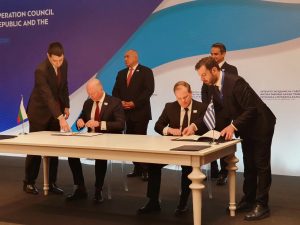 Bulgaria’s Minister of Transport, Rossen Jeliazkov, and his Greek counterpart, Kostas Karamanlis, signed an agreement to accelerate the construction process of Thessaloniki – Ruse railway corridor.
Bulgaria’s Minister of Transport, Rossen Jeliazkov, and his Greek counterpart, Kostas Karamanlis, signed an agreement to accelerate the construction process of Thessaloniki – Ruse railway corridor.
The bilateral agreement aims at the creation of a framework that facilitates and accelerates the cross-border co-operation.
“I strongly believe that strengthening our cooperation can only benefit both countries economically and geopolitically. At the core of this cooperation I believe it should be a modern, electric-powered Burgas-Alexandroupolis rail link,” Karamanlis said.
During the meeting, the establishment of a joint committee was proposed which, together with the competent authorities of the EU will be responsible for the feasibility study, financing and implementation of the project.
The signature of the document took place during the Fourth session of the High-Level Cooperation Council between the governments of the two countries. Both ministers of transport discussed key issues for the implementation of the project concerning the financing and infrastructure maintenance.
“Our teams are yet to specify where the border crossing point will be situated, which is important both for the construction of the new one and for the integration of the existing infrastructure,” Jeliazkov added after the talks,” the Bulgarian Minister of Transport said.
The memorandum will also contribute to the cross-border railway traffic regulation, which aims at establishing a framework that will facilitate and accelerate the railway border crossing cooperation between our two countries and will regulate the related procedures for all railway undertakings having access to the current railway infrastructure, according to the EU acquis and the national legislation of the involved parties.
The two countries will further examine the implementation of the Thessaloniki – Kavala – Alexandroupolis – Burgas – Varna – Ruse railway corridor which will increase the competitiveness on the Orient – East Med Corridor, by reducing the transit times and improving the capacity.
The project was estimated at EUR 3.7 billion which envisages the creation of a double track electrified line, equipped with ERTMS, providing the needed capacity to the ports along the route.
The project is seen as a great opportunity for Bulgaria and Greece to modernise the transport infrastructure as well as to create a competitive railway transport system.
Share on:



